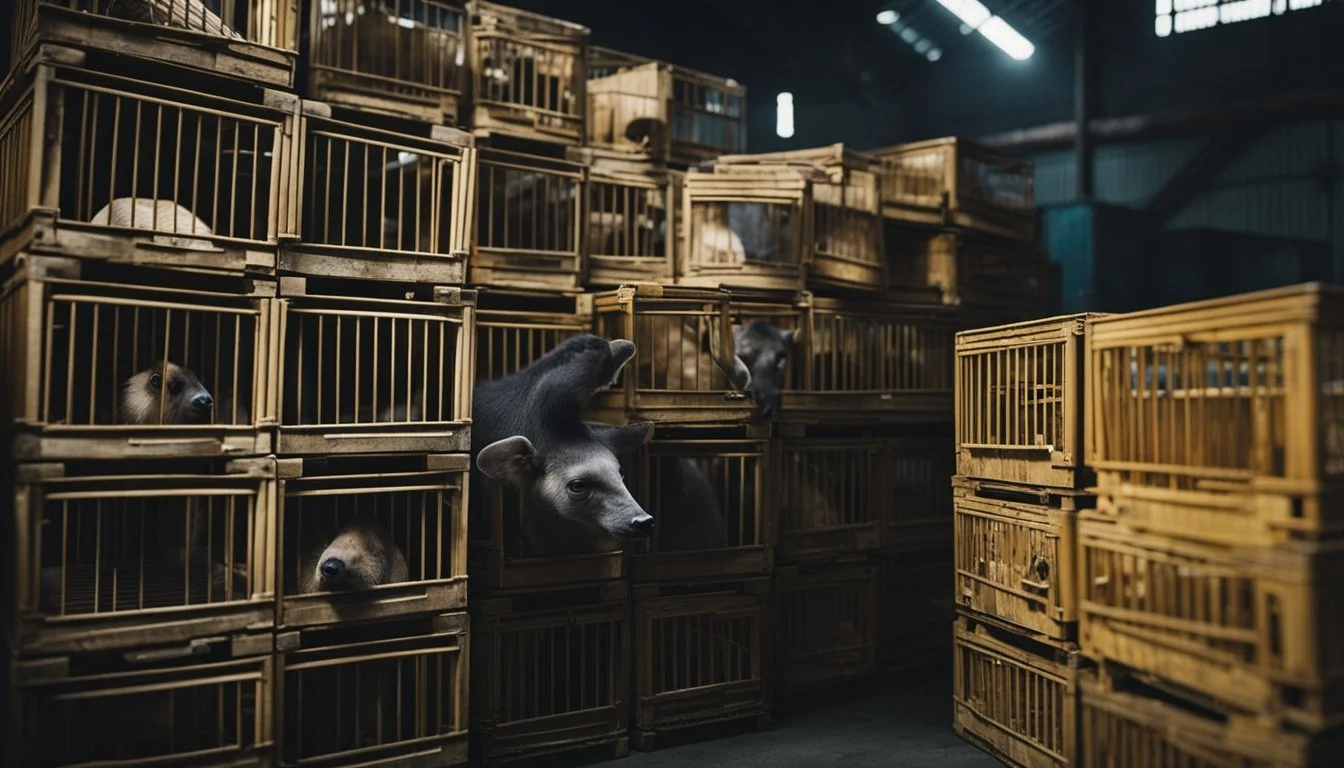6 True Crime Documentaries About Wildlife Trafficking in Conservation Groups
Unveiling Hidden Crimes
Wildlife trafficking represents a significant threat to global biodiversity and conservation efforts. As criminal activities targeting protected species become increasingly sophisticated and lucrative, documentaries highlighting these issues offer eye-opening insights into the problem and the ongoing battle to combat it.
In exploring these six true crime documentaries about wildlife trafficking, viewers gain a clearer understanding of the intricate networks behind the illegal trade of animals and plants, and how these operations impact conservation groups worldwide. By delving deeper into the personal stories of those fighting on the frontlines, these films highlight both the challenges and triumphs in the struggle to preserve the planet's most vulnerable species.
1) The Ivory Game (2016)
"The Ivory Game" is a significant documentary that focuses on the illegal ivory trade. Produced by Terra Mater Factual Studios and Vulcan Productions, it is a collaboration that includes Leonardo DiCaprio as an executive producer. The film's goal is to bring the elephant poaching crisis in Africa to a broader audience.
Directed by Richard Ladkani, the documentary takes an undercover approach to expose the dark world of ivory trafficking. It reveals how poachers and crime syndicates operate, showing the severe impact of illegal ivory trade on elephant populations.
The film utilizes investigative footage, immersing viewers into the grim reality of ivory poaching. It highlights the involvement of both local poachers and international networks. This deep dive into the trade's operation structure aims to generate awareness and drive change.
"The Ivory Game" has gained recognition, including being shortlisted for the Oscars in 2017. Its powerful narrative and haunting visuals serve as a compelling call to action against wildlife trafficking. The documentary's thorough investigation makes it a crucial piece for anyone interested in true crime and conservation.
For more information, visit the IMDB page for The Ivory Game.
2) The Animal People (2019)
"The Animal People" explores the radical animal rights campaign targeting multinational corporations involved in animal testing.
The documentary delves into the story of six activists who faced government surveillance and legal battles for their actions.
The film provides an in-depth look at the ethical controversies surrounding animal testing and the extremities some activists go to for animal rights.
Directed by Casey Suchan, the film presents a compelling perspective on activism and its consequences.
3) Blood Lions (2015)
"Blood Lions" is a documentary that shines a light on the alarming practice of canned hunting in South Africa. The film uncovers how captive-bred lions are killed for sport, raising ethical concerns about the exploitation of these majestic animals.
Premiering in 2015, the documentary exposes the predator breeding industry and its misleading claims. It highlights how these practices are presented as conservation efforts, but in reality, they contribute to wildlife trafficking and animal cruelty.
The film features reporters and activists who investigate and reveal the severity of the issue. Through their work, "Blood Lions" aims to mobilize global action against these exploitative practices.
Directed by Bruce Young and Nick Chevallier and produced by Pippa Hankinson and Jeremy Nathan, "Blood Lions" is a powerful call to end canned hunting. The film has received attention for its impactful storytelling and compelling footage.
For more information, refer to the Blood Lions page on IMDb.
4) Pangolins in Peril
"Pangolins in Peril" (2023) is a crucial documentary highlighting the severe threats faced by pangolins in Africa.
Pangolins are the world's most trafficked mammal, with their scales highly valued in traditional medicine. The documentary sheds light on the escalating hunting and trafficking activities driven by demand from Asia. It aims to raise awareness and promote conservation efforts to protect these unique creatures.
The film features interviews with wildlife experts and conservationists who discuss the importance of pangolins in ecosystems. Pangolins help control insect populations, such as ants and termites. Their declining numbers could lead to disruptive ecological consequences.
In addition to showcasing harrowing scenes of pangolins' suffering, the documentary also explores global initiatives to combat wildlife trafficking. These efforts include stricter enforcement of wildlife protection laws and international collaboration to curb illegal trade.
For more information about the film "Pangolins in Peril," visit IMDb.
5) Wildlife Warzone (2018)
"Wildlife Warzone" delves deep into the frontlines of wildlife conservation. It brings to light the intensity and dangers faced by anti-poaching teams in various parts of Africa.
The documentary focuses on the tactics used by both conservationists and poachers. It provides an unfiltered look at the daily battles to protect endangered species from extinction.
Viewers get a close-up view of the sophisticated methods employed by poachers. These range from utilizing high-powered rifles to sophisticated tracking systems.
The film highlights the resilience and dedication of the anti-poaching units, often operating in harsh and dangerous environments.
The emotional toll on these individuals and the communities involved is also depicted, painting a comprehensive picture of the ongoing struggle.
6) The Extinction Market (2017)
"The Extinction Market" delves into the dark world of wildlife trafficking and its devastating impacts on global biodiversity. Focusing on issues like poaching and illegal trade, the documentary explores how these activities are pushing numerous species to the brink of extinction.
It goes beyond the more commonly known threats to elephants, rhinos, and tigers. The film covers a broader range of species affected by the illegal wildlife trade. It presents both the human and ecological toll of this crisis.
Experts and conservationists featured in the film offer solutions to combat these illegal activities. They suggest policy measures and enforcement strategies aimed at reducing demand and disrupting trafficking networks. The documentary provides a comprehensive look at both the root causes and possible resolutions.
By offering real insights from fieldwork and research, "The Extinction Market" offers viewers a clear understanding of the multifaceted challenges in combating wildlife trafficking.
For more information on "The Extinction Market," visit IMDb
The Connection Between Wildlife Trafficking and Conservation Groups
Wildlife trafficking, a critical conservation issue, cripples biodiversity and fuels organized crime. Conservation groups play a pivotal role in disrupting this illicit trade through regulation, awareness, and law enforcement collaboration.
Understanding Wildlife Trafficking
Wildlife trafficking involves the illegal trade of animals and plants, pushing many species toward extinction. This multibillion-dollar underground industry spans continents and often intersects with other organized crimes such as money laundering and corruption.
Key factors enabling wildlife trafficking include high demand for exotic pets, traditional medicine ingredients, and luxury items. Technological advancements allow traffickers to operate online, making law enforcement's job increasingly complex.
Role of Conservation Groups
Conservation groups serve as frontline defenders against wildlife trafficking, advocating for stronger laws and better enforcement. These organizations often collaborate with governments and international bodies like INTERPOL to dismantle trafficking networks.
Conservation groups also engage in public awareness campaigns to reduce demand for illegal wildlife products. By educating communities and influencing public opinion, they create a hostile environment for traffickers. Furthermore, these groups help train law enforcement on how to identify and deal with trafficked wildlife.
Impact on Biodiversity
Wildlife trafficking significantly disturbs biodiversity by removing key species from their natural habitats. This illegal trade disrupts ecosystems and can lead to the collapse of local environments. Additionally, the introduction of trafficked species into non-native areas can result in invasive species problems, further stressing local wildlife.
By tackling wildlife trafficking, conservation groups help maintain ecological balance and ensure the survival of threatened species. Their work, from grassroots activities to high-level policy advocacy, underscores the crucial link between combatting illegal trade and preserving biodiversity.
Legal and Ethical Challenges
Wildlife trafficking presents significant legal challenges under various international laws and ethical dilemmas for conservationists trying to protect endangered species.
International Wildlife Laws
International agreements such as the Convention on International Trade in Endangered Species of Wild Fauna and Flora (CITES) aim to regulate and monitor wildlife trade. CITES lists species under different appendices to manage their trade status—Appendix I for species threatened with extinction, and Appendix II for those needing controlled trade to avoid endangerment.
Countries also enforce their national laws, such as the United States' Lacey Act of 1900, which prohibits illegal trade of wildlife, fish, and plants. Another critical law is the Eliminate, Neutralize, and Disrupt Wildlife Trafficking Act of 2016, focusing on combating wildlife trafficking through stricter enforcement.
Effective enforcement is crucial. Failures can result in the illegal trade flourishing and species suffering from unsustainable exploitation.
Ethical Dilemmas Faced by Conservationists
Conservationists often face complex ethical issues. Balancing the rights of local communities who depend on wildlife for their livelihood with the necessity of protecting endangered species can be challenging. Local reliance on natural resources for income can conflict with conservation efforts.
Additionally, some anti-poaching measures can be extreme, raising human rights concerns. The deployment of armed guards and the use of force against poachers can create ethical debates regarding the right approach to conservation enforcement.
Transparency and collaboration with indigenous peoples and local communities are essential in tackling wildlife trafficking ethically. Conservationists must navigate these moral complexities while finding sustainable solutions to protect biodiversity.




